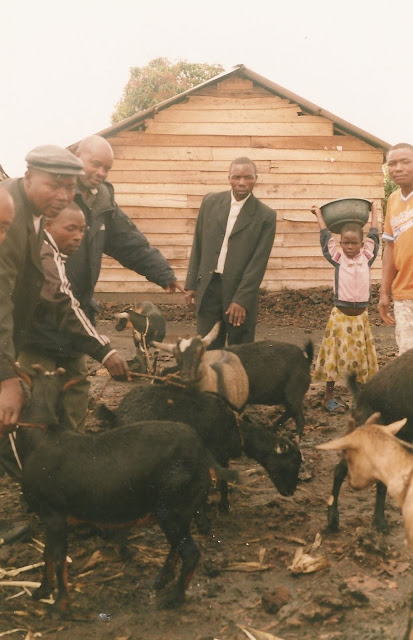
Daniel Wealthrise Wedding 2014
Although marriage traditions may vary from rural to urban areas, weddings in Nigeria often follow several common customs. Formal meetings between the couple's families, the offer of a dowry and an engagement ceremony are all traditional events prior to a wedding ceremony. While dating and selecting your own spouse occurs in urban areas, arranged marriages are frequent in Nigeria.
 |
| Daniel Wealthrise Wedding 2014 |
Although marriage traditions may vary from rural to urban areas, weddings in Nigeria often follow several common customs. Formal meetings between the couple's families, the offer of a dowry and an engagement ceremony are all traditional events prior to a wedding ceremony. While dating and selecting your own spouse occurs in urban areas, arranged marriages are frequent in Nigeria.
Introduction Ceremony
Prior to an engagement, the families of the bride and the groom become acquainted through a formal ceremony. The groom's family usually travels to the home of the bride's family and presents a letter requesting the woman's hand in marriage. Traditional dances and the offer of a dowry are part of the process to persuade the bride's family to accept the letter. This ceremony often occurs only a few days before the wedding.
Prior to an engagement, the families of the bride and the groom become acquainted through a formal ceremony. The groom's family usually travels to the home of the bride's family and presents a letter requesting the woman's hand in marriage. Traditional dances and the offer of a dowry are part of the process to persuade the bride's family to accept the letter. This ceremony often occurs only a few days before the wedding.
Engagement Ceremony
The evening before the wedding day, the groom's family visits the bride's family again. This visit is to hear the response to the letter that was presented during the introduction ceremony. If a positive response is given, both families are formally introduced to the guests. Friends and family celebrate the engagement with food and drink. Often the groom's family provides traditional foods such as palm, yam, sugar and drinks as well as offering the bride's family a suitcase packed with traditional clothing, bags, shoes and jewelry. The officiating elder, the person who transferred the messages between the couple's families, drinks from a cup of palm wine and may also invite the bride and the groom to share the drink. When the ceremony has ended, the bride remains at her father's house to prepare for the wedding ceremony.
The evening before the wedding day, the groom's family visits the bride's family again. This visit is to hear the response to the letter that was presented during the introduction ceremony. If a positive response is given, both families are formally introduced to the guests. Friends and family celebrate the engagement with food and drink. Often the groom's family provides traditional foods such as palm, yam, sugar and drinks as well as offering the bride's family a suitcase packed with traditional clothing, bags, shoes and jewelry. The officiating elder, the person who transferred the messages between the couple's families, drinks from a cup of palm wine and may also invite the bride and the groom to share the drink. When the ceremony has ended, the bride remains at her father's house to prepare for the wedding ceremony.
Wedding Day
Depending upon the local custom, the bride's elders may help her to bathe and prepare for the wedding. In a traditional Nigerian wedding, the bride usually wears imported Indian fabrics as well as a decorative coral-beaded headpiece, ankle bracelets and necklaces. The bride's hands and feet may be decorated with intricate henna designs. When she is ready, the father of the bride accompanies her to the church. After the ceremony, there is a party that frequently lasts late into the night. Live bands may perform traditional music while everyone enjoys a meal and dancing. After the party, the bride returns to her father's home to change out of her wedding attire. Her new husband arrives with his family to claim his bride and the couple departs to begin their new life together.
Source: USA Today
Depending upon the local custom, the bride's elders may help her to bathe and prepare for the wedding. In a traditional Nigerian wedding, the bride usually wears imported Indian fabrics as well as a decorative coral-beaded headpiece, ankle bracelets and necklaces. The bride's hands and feet may be decorated with intricate henna designs. When she is ready, the father of the bride accompanies her to the church. After the ceremony, there is a party that frequently lasts late into the night. Live bands may perform traditional music while everyone enjoys a meal and dancing. After the party, the bride returns to her father's home to change out of her wedding attire. Her new husband arrives with his family to claim his bride and the couple departs to begin their new life together.
Source: USA Today













